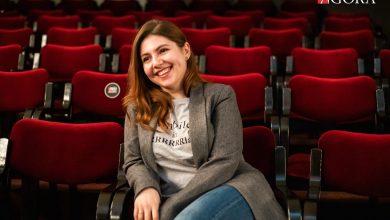If you are a journalist, don’t forget to ask yourself these questions every day

Ana Gherciu
Executive Director of Moldova.org
About 4-5 years ago I met a journalist from New Zealand who complained that it was very boring to do press in their country, as almost nothing ever happened there. Everyone got along well. There was barely any corruption. She had come to Moldova to write on the discrimination of the LGBT community and the conflict between Russian and Romanian speakers. How different things would be here if local journalists were interested, like her, in underrepresented groups, in complicated topics. If we weren’t as few as we are now, I thought.
It is a great luxury to work in the press if you love humanity. It sounds pompous, of course, but the role of professional journalists is crucial for a healthy society, in which there is a place for everyone. Not every job gives you access to the people who are at the basis of information and the opportunity to give it nuance, context and diversity.
Today, when more and more people believe that anyone can do an interview, it’s more important than ever for journalists to raise their speed and level. The luxury of access comes with work. However, there is a very important detail that is not really learned in journalism schools and is applied very little in newsrooms. I’m talking about what westerners call “confirmation bias” among journalists.
Confirmation bias is a human trait to overlook gaps and consider as correct new information that confirms what we already believe. Instinctively, we incorporate this information into our value system and use it as a reference. At the same time, if we are presented with information that contradicts “our truth”, most will become defensive, notice every slip, and quickly forget it.
Our readers, our viewers have the right to do that. We, journalists, have not. Newsrooms must have all kinds of filters. Am I looking into this topic only because it is important for me or because I know what my audience needs? Have I told the stories of everyone involved or only of those who have a shorter way to my microphone? Have I created enough space for diversity and understanding? Have I done everything possible to reach those I work for? If you answered “No” at least once, you know what to do.
Why the fake about the arrival of 30 thousand Syrians in Moldova was a real scare for a good part of our fellow citizens? Because the few Syrians who already lived here are not represented in our press. Because the majority of people in Moldova knows only stereotypes about the Syrian people. And everything that is alien, distant, different and vulnerable is hard to accept and look at with good eyes.
The same applies to propaganda against the LGBT community, Muslims, atheists, Roma, students from India, etc. Whatever we, journalists, don’t address, propagandists and authors of fakes use for their purposes. By not representing vulnerable groups, by publishing information without context and nuance we become accomplices of those who misinform.
168 thousand people in Moldova have various types of special needs. Of them, more than 9,500 people are visually impaired. How do they move through their localities, the country, if even those without disabilities encounter many obstacles? Almost 16 thousand women provide sexual services. Who protects them and who are their clients in a deeply traditionalist country? The rate of school education among Roma children has been stagnating for years below 15%. More than three-quarters of students in a study conducted in Moldova witnessed bullying, and classrooms are where it happens most often. What knowledge and experiences do future voters take from school? Employment rate among women remains lower than among men, and their wages remain lower, too. At the same time, men in Moldova commit suicide almost seven times more often than women. How do we eliminate these discrepancies? How do we get closer to each other?
If we prioritize such topics, instead of superficialities published by influencers on social media or populist exchanges between politicians, the agenda of discussions would be dictated by the press and not the other way around.
Let’s ask ourselves more often what we are missing and ask better questions. Let’s talk more, more often and more in depth about what inclusion and acceptance of diversity means. We wouldn’t leave propagandists without work, but we would certainly manage to build a society more resistant to fakes.
The material was published as part of the “Inclusion Starts with Me” campaign.
The campaign is organized within the project “Building cohesion in Moldova through promoting social inclusion and diminishing discrimination” carried out by the Independent Journalism Center within the program “Joint Initiative for Equal Opportunities – Phase II”, implemented with the support of the Government of Switzerland.




